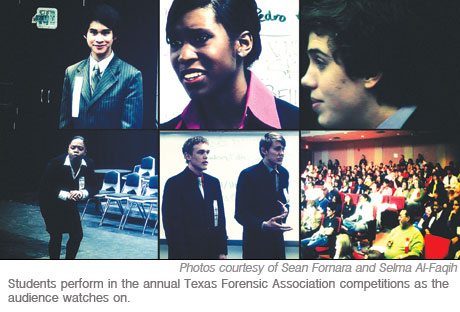Documentary’s Focus Is Subject to Debate
Now that Friday Night Lights has completed its fifth and final season, it might be an appropriate time for our football-crazy state to consider activities for its youth that don’t require sacrificing life or limb.
How about, say, speech and debate tournaments? What better to replace the head-crunching ferocity of football than the head-scratching delight of competitive acting? Why not encourage our high-schoolers to experience the joy and ruin of ruthless competition in the comparatively safe venue of forensics? There they can talk, act, tell stories, interpret and conduct what the ancient Romans called “the business of the forum.“
For those who worry that “competitive acting” won’t provide kids the kind of brutal, hard-nosed, face-in-the-mud, to-the-death struggle that football does, allow me to recommend Thank You for Judging, a documentary about the high-stakes world of competitive interpretation. The documentary itself vied for the narrative documentary prize at this year’s Austin Film Festival. Early in the film, a debate coach brushes aside criticism that performance and antagonism don’t mix, as if to preempt any skepticism about the movie. “All art is competitive,” she says.
The universe of speech and debate is a bizarre one. Nearly every weekend during forensics season, from August through February, the Texas Forensic Association (TFA) organizes competitions in debate and dramatic performance for high school students around the state. At these competitions, students essentially act against one another, performing solo interpretations of fictional works, acting in pairs (partners are not allowed to look at or touch each other, turning each 10-minute show into an absurdist interpretive dance), even writing and performing their own orations on topics of personal importance. These performances can take the form of first-person monologues or multi-character “plays”; each character is performed by the same actor, shifting accents, gesticulations and facial expressions on a dime. In their quest for trophies, students squawk and yell and emote and grimace and jump around, throwing subtlety out of the window. And then, come March, the association holds a state tournament to choose the finest competitive high school actor in Texas.
 In 1998, that was Michael Urie, then a senior at Plano Senior High School, who has since gone on to a successful career as a stage and screen actor, co-starring on the TV show “Ugly Betty.” Urie is one of several directors of Thank You for Judging, which captures the tension and excitement of the 2008 TFA state championships, where a pool of 1,000 students from 168 schools was whittled down to one.
In 1998, that was Michael Urie, then a senior at Plano Senior High School, who has since gone on to a successful career as a stage and screen actor, co-starring on the TV show “Ugly Betty.” Urie is one of several directors of Thank You for Judging, which captures the tension and excitement of the 2008 TFA state championships, where a pool of 1,000 students from 168 schools was whittled down to one.
For many of the film’s subjects, who feel indifferent toward and left out of the more physical endeavors celebrated in Texas, speech and debate provide a much-needed outlet for self-expression in an accepting community. The issue of sexual identity, in particular, runs throughout Thank You for Judging. Students performing monologues about coming out as gay find their goals thwarted by small-minded, and anonymous, judges who view scoring the students as an opportunity to save souls. Urie and his fellow directors see forensics as not just an end in itself, but as a means toward self-actualization for kids who are consistently on the outside looking in.
The directors disappoint when they fail to train the same thoughtful lens on issues of race and class. They follow several subjects into the gated communities of Plano, where education and opportunity are taken for granted. But most of Texas exists outside those gates, so it makes no sense that Urie and his colleagues give barely three minutes of screen time to a forensics team in rural Princeton—where most of the students can’t afford the hefty registration fees or suits and dresses the sanctioned competitions require. Similarly, the directors spend about 30 seconds on a controversy caused by the disqualification of two African-American competitors from inner-city Houston, who, according to their coach, were guilty of nothing more than “stretching the rules.” What they did to stretch them, and how that might have introduced a culturally broader way of looking at the forensic arts, goes shamefully unexplored.
There’s no doubt that speech and debate are as competitive as any sporting event, in addition to being socially attuned. Participants seem to pride themselves on challenging conventional notions. Yet that oldest of conventions—the financial demands and cultural limitations accentuating the vast gap between those with and without means—is tolerated and swept under the rug. Maybe these opportunities for self-expression and membership in a caring community that Urie and his fellow interpreters love to trumpet are available only to some. Say what you will about football; it provides a chance for poor kids to move up, same as the rich kids.


